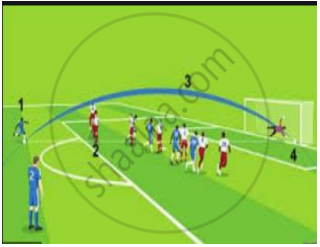Advertisements
Advertisements
प्रश्न
Find the zeroes of the following quadratic polynomial and verify the relationship between the zeroes and the coefficients.
6x2 – 3 – 7x
उत्तर
6x2 - 3 - 7x
= 6x2 - 7x - 3
= 6x2 -9x + 2x -3
= 3x(2x - 3) + 1(2x - 3)
= (2x - 3)(3x + 1)
= `2(x - 3/2)3(x+1/3)`
For p(x) = 0 we have,
Either (3x + 1) = 0
`x = -1/3`
or (2x - 3) = 0
`x = 3/2`
Thus, the zeroes of
6x2 - 3 - 7x are `-1/3 "and" 3/2`
⇒ Sum of the zeroes = `"-Coefficient of x"/("Coefficient of" x^2)`
⇒ `-1/3 + 3/2= (- (-7))/6`
⇒ `7/6 = 7/6`
Product of the zeroes = `"Constant term"/("Coefficient of "x^2)`
= `-1/3 xx 3/2=(-3)/6`
⇒ `-1/2 = -1/2`
Thus, the relationship between the zeroes and coefficients in the polynomial 6x2 - 3 - 7x is verified.
संबंधित प्रश्न
Find the zeroes of the following quadratic polynomial and verify the relationship between the zeroes and the coefficients.
4u2 + 8u
Find a quadratic polynomial with the given numbers as the sum and product of its zeroes respectively.
`-1/4 ,1/4`
If a and are the zeros of the quadratic polynomial f(x) = 𝑥2 − 𝑥 − 4, find the value of `1/alpha+1/beta-alphabeta`
If 𝛼 and 𝛽 are the zeros of the quadratic polynomial f(t) = t2 − 4t + 3, find the value of `alpha^4beta^3+alpha^3beta^4`
If the sum of the zeros of the quadratic polynomial f(t) = kt2 + 2t + 3k is equal to their product, find the value of k.
If If α and β are the zeros of the quadratic polynomial f(x) = x2 – 2x + 3, find a polynomial whose roots are α + 2, β + 2.
If If α and β are the zeros of the quadratic polynomial f(x) = x2 – 2x + 3, find a polynomial whose roots are `(alpha-1)/(alpha+1)` , `(beta-1)/(beta+1)`
Find the zeroes of the quadratic polynomial `4x^2 - 4x + 1` and verify the relation between the zeroes and the coefficients.
Find the quadratic polynomial whose zeroes are `2/3` and `-1/4` Verify the relation between the coefficients and the zeroes of the polynomial.
If 3 and –3 are two zeroes of the polynomial `(x^4 + x^3 – 11x^2 – 9x + 18)`, find all the zeroes of the given polynomial.
If α, β are the zeros of the polynomial f(x) = ax2 + bx + c, then\[\frac{1}{\alpha^2} + \frac{1}{\beta^2} =\]
A quadratic polynomial, the sum of whose zeroes is 0 and one zero is 3, is
If \[\sqrt{5}\ \text{and} - \sqrt{5}\] are two zeroes of the polynomial x3 + 3x2 − 5x − 15, then its third zero is
If x + 2 is a factor of x2 + ax + 2b and a + b = 4, then
Basketball and soccer are played with a spherical ball. Even though an athlete dribbles the ball in both sports, a basketball player uses his hands and a soccer player uses his feet. Usually, soccer is played outdoors on a large field and basketball is played indoor on a court made out of wood. The projectile (path traced) of soccer ball and basketball are in the form of parabola representing quadratic polynomial.


What will be the expression of the polynomial?
Given that one of the zeroes of the cubic polynomial ax3 + bx2 + cx + d is zero, the product of the other two zeroes is ______.
Find the zeroes of the following polynomials by factorisation method and verify the relations between the zeroes and the coefficients of the polynomials:
`2x^2 + (7/2)x + 3/4`
Find a quadratic polynomial whose zeroes are 6 and – 3.
The zeroes of the polynomial p(x) = 25x2 – 49 are ______.
